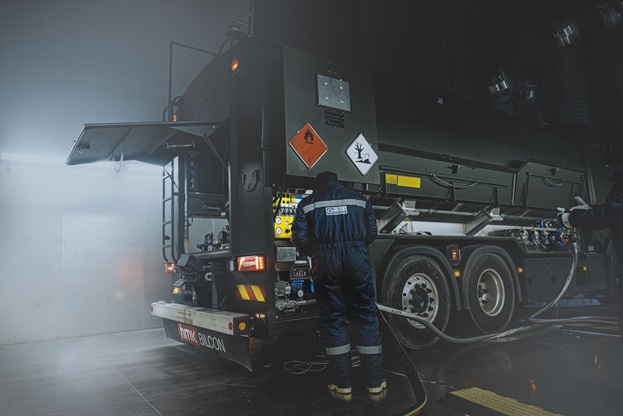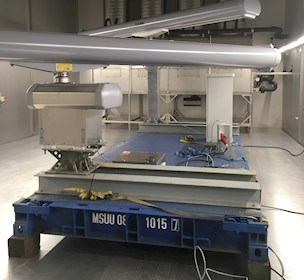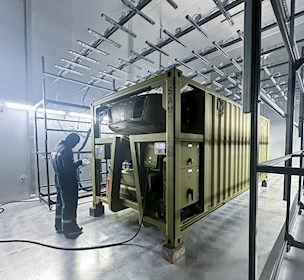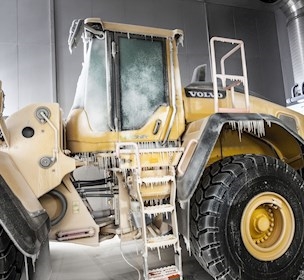HMK Bilcon validated full fuel truck systems for Arctic defence at -32 °C
Cold testing prompted design changes and updated routines that now define the baseline for all future HMK Bilcon fuel truck deliveries, regardless of customer or climate.
Can you trust your military equipment to function at -32 °C?
Suppliers to the defence industry are increasingly expected to prove that their equipment can handle extreme environments. What was once assumed performance now needs to be documented, especially when it comes to cold weather validation. Defence procurement processes in NATO countries are tightening, and without proof of reliability in Arctic conditions, approval may not be granted, and contracts may be lost. For many, that means rethinking design, testing and supplier collaboration from the ground up.
Design for reliability in a harsher defence climate
For fuel trucks and transport containers intended for the Swedish Armed Forces, functionality in extreme temperatures has become a contractual requirement. That means that the ability to verify cold weather functionality is a deciding factor in market access for defence vehicle contractors.
From assumption to evidence: HMK Bilcon's turning point
HMK Bilcon is a Danish manufacturer of specialised fuel trucks, containers and mobile units. When the company entered a long-term opportunity with the Swedish Armed Forces, the requirements were clear: no delivery without documented functionality at –32 °C. Unlike previous contracts, this project required verified cold performance as a formal condition.
The Swedish Armed Forces had scheduled live testing at their own facility as a final go/no-go point. To ensure readiness, HMK Bilcon brought a fully assembled fuel truck, including components from several sub-suppliers, to our climate chamber in Lindø.


testing turned lessons into lasting product improvements.
Just because it works on paper doesn't mean it works in the cold
The first test revealed failures that had not been visible on paper:
"Some of the components were claimed to handle the temperature but hadn't been tested in practice. A few suppliers were surprised when we didn't pass the first round. The test made it clear what needed to change, and we moved quickly to reshuffle and amend the setup so we could pass the live, full-scale testing of the entire truck," says HMK Bilcon CEO Peter Jensby.
The process led to a targeted redesign that ensured the vehicle met all requirements ahead of final approval.
"Testing equipment in extreme cold often brings surprises. We worked closely with HMK Bilcon to limit the number of those and were able to retest almost immediately when adjustments had been made," FORCE Technology Materials and Components Test Engineer Rasmus Gehrt Cardél says.
Tests conducted on HMK Bilcon fuel trucks
- Environmental testing in a climate chamber down to -32 °C. Standard: AECTP-230 C1-conditions (-21°C to -32°C.)
- Outfitting the fuel truck with sensors at critical points
- Evaluating startup performance, functionality and failure points under live conditions.

From one-off test results to new product baseline
The cold climate testing wasn't just a green light for a single delivery; it became the new baseline for all future HMK Bilcon fuel trucks. Even when cold performance isn't explicitly required in the contract, the company now treats it as standard.
"We changed some components and suppliers and updated both documentation and testing routines following the climate chamber testing. The process helped us set a new standard of quality for our vehicles. The collaboration helped us pass a test and ultimately design better products. We'll be back. We want every product tested live before it reaches the customer. FORCE Technology gets my coldest recommendations," Peter Jensby concludes.
Early involvement can help defence suppliers avoid costly setbacks
"We're seeing more defence industry suppliers come to us for environmental validation and defence equipment testing. Each case adds to our experience, and as more military vehicles and defence systems pass through the climate chamber, we see clear patterns as to where and when product challenges emerge. With early involvement, we can help mitigate those issues before they escalate or have dire consequences. What drives us is helping customers move beyond basic compliance to achieve reliable performance in real operational conditions, FORCE Technology Senior Business Development Manager for Defence & Space Mehdi Banisi says.





